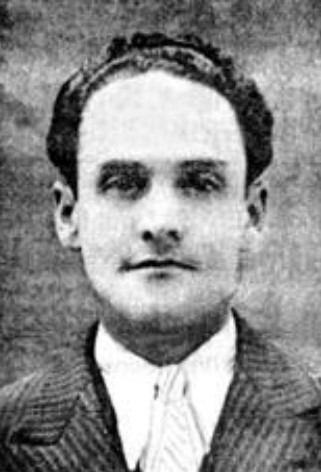Antonio Montalvo Viteri (Ambato, March 24, 1901 – Quito, July 9, 1953) was an Ecuadorian poet, literary critic, and cultural figure who played a key role in shaping early 20th-century Ecuadorian literature. He co-founded the influential newspaper El Espectador in 1921, published his first poetry collection Alba de Ensueño in 1922, and later helped establish the literary magazine El Cosmopolita in 1924. A member of several intellectual societies, he also co-founded the Grupo América in 1931. His 1947 biography of Eugenio Espejo is regarded as one of the best on the subject, cementing his reputation as both a poet and a biographer.
Early Life and Education
Antonio Montalvo Viteri was born on March 24, 1901, in Ambato, Ecuador. He was the son of Lieutenant Colonel Manuel Montalvo Hidalgo and Isabel Viteri Mantilla, who lived to the age of 94. From an early age, Montalvo was immersed in a rich cultural environment. At six years old, he began his formal education at the Instituto Martínez in Ambato. By 1913, he enrolled at the Liceo Montalvo, where he was taught by prominent Ambato intellectuals, including Rafael Gómez Vásquez, Juan Francisco Montalvo Quirola, and Oscar Efrén Reyes. These mentors sparked his passion for literature and history, and their influence played a critical role in shaping his intellectual pursuits.
In 1915, at the age of 14, Montalvo moved to Vinces to live with his uncle, Augusto Viteri Mantilla. There, he gained access to an impressive library, one of the best in the region, which deepened his literary development. The wealth of knowledge available in his uncle’s library further fueled his intellectual curiosity and passion for writing.
Literary Career
Antonio Montalvo Viteri began his literary career at a young age. In 1921, at just 20 years old, he co-founded the biweekly newspaper El Espectador in Ambato with Alfredo Martínez. This early project marked his entrance into the Ecuadorian literary scene. In the following year, Montalvo published his first major work, Alba de Ensueño, a collection of poems. He and Martínez also launched the monthly publication Los Centauros, which became a platform for sharing modernist literary ideas.
In 1924, Montalvo, Martínez, and Nicolás Rubio Vásquez founded El Cosmopolita, a publication intended to perpetuate the ideals of Ecuador’s renowned intellectual, Juan Montalvo. Montalvo’s dedication to preserving these values reflected his deep connection to the cultural and historical legacy of his country.
In 1929, Montalvo moved to Quito, where he quickly integrated into the city’s intellectual circles. He became a member of the Sociedad Jurídico Literaria and the Sociedad Bolivariana. The following year, he published his second book of poems, Camino (1930), further establishing himself as an influential poet in Ecuador.
In 1931, Montalvo and Martínez co-founded the Grupo América and the accompanying journal of the same name. This group became a vital space for intellectual and literary discourse in Ecuador, contributing to the development of Ecuadorian poetry and criticism. His work with the Grupo América and its journal helped introduce new ideas and foster collaboration among writers and critics in the region.
Later Career and Achievements
Antonio Montalvo’s contributions to Ecuadorian literature extended beyond poetry. In 1944, he collaborated with Augusto Arias to edit the Antología de Poetas Ecuatorianos, a significant collection showcasing the country’s poetic talent. In 1947, Montalvo published Biografía de Espejo, a biography of Eugenio Espejo, one of Ecuador’s most important historical figures. This biography is considered one of the finest works ever written on Espejo, solidifying Montalvo’s reputation as both a poet and a literary critic.
In addition to his literary work, Montalvo held several important cultural and governmental roles. He served as the Subsecretary of the Ministry of Government, head of the Cultural Section of the Ministry of Education, and as Secretary of the Instituto de Cultura Hispánica. These positions allowed him to influence cultural policy and support Ecuador’s literary development.
Personal Life
Antonio Montalvo’s personal life was deeply intertwined with his literary activities. His longstanding friendship and collaboration with Alfredo Martínez marked much of his career. Together, they worked on numerous publications and intellectual projects, shaping the literary landscape of early 20th-century Ecuador.
Death and Legacy
Antonio Montalvo Viteri passed away on July 9, 1953, in Quito, Ecuador, at the age of 52. Though he died relatively young, his impact on Ecuadorian literature and intellectual life was profound. His work, particularly his poetry and his biography of Eugenio Espejo, is remembered for its elegance and intellectual depth. Montalvo’s contributions to the Grupo América and his various editorial projects left a lasting legacy, influencing generations of Ecuadorian poets and writers.
Selected Works
- Alba de Ensueño (1922) – A collection of poems.
- Camino (1930) – A book of poetry.
- Antología de Poetas Ecuatorianos (1944) – Edited with Augusto Arias, an anthology of Ecuadorian poetry.
- Biografía de Espejo (1947) – A highly regarded biography of Eugenio Espejo, a key figure in Ecuadorian history.
References
- Enciclopedia del Ecuador. “Antonio Montalvo.” Retrieved on September 23, 2024.
- Ecured. “Antonio Montalvo Viteri.” Retrieved on September 23, 2024.
- Corporación Grupo América. “Revista América 130.” Retrieved on September 23, 2024.

